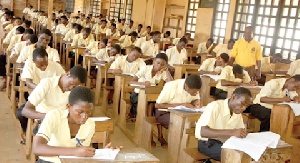About 55,000 out-of-school children from five regions have begun classes under the Ghana Complementary Basic Education (GCBE) programme to facilitate their enrolment into the formal education system.
The GCBE programme is a three-year initiative, which began in 2013 with sponsorship from the Department for International Development (DFID). The beneficiary regions are Northern, Upper West, Upper East, Brong Ahafo and Ashanti.
The GCBE programme, which is being implemented by 10 non-governmental organizations in the regions, seeks to give out-of-school children beyond school starting age (eight to 14) an opportunity to acquire basic literacy and numeracy skills in their mother-tongues to enable them to enroll in the formal school system.
Alhaji Hussein Abdulai Ziblim, Deputy Manager in-charge of Operations of School for Life, one of the implementing NGOS, who launched the programme at Kushibo in the Kumbungu District, on Tuesday, said community volunteers had been trained on the GCBE methodology to facilitate the programme to ensure success.
The GCBE methodology involves participatory learning approach, word formation, the use of classroom register amongst others, which enable pupils to imbibe the lessons.
Alhaji Ziblim said the classes would run for nine months (October to June) after which the pupils would be in a position to enroll in the formal school system entering between Primary Three and Primary Six, depending on their abilities.
He said School for Life would mount classes for 12,300 pupils in 492 communities in nine districts, including Kumbungu, Saboba, Mion, Zabzugu, Sagnarigu, Nanumba South and Yendi Municipality of Northern and Upper West Regions.
Alhaji Iddi Manzah Mahama, District Chief Executive for Kumbungu, whose speech was read on his behalf, called on communities to support teachers in their efforts to improve the standard of education, especially in the Northern Region.
Madam Hawa Yussif Pontomprom, Kumbungu District Director of Education, commended School for Life for its complementary roles in supporting the government to increase access to quality education.
Madam Pontomprom urged parents to prioritize the education of their children by proving them with the necessary basic facilities to enable them to concentrate on lessons taught in school.
Regional News of Thursday, 16 October 2014
Source: GNA













